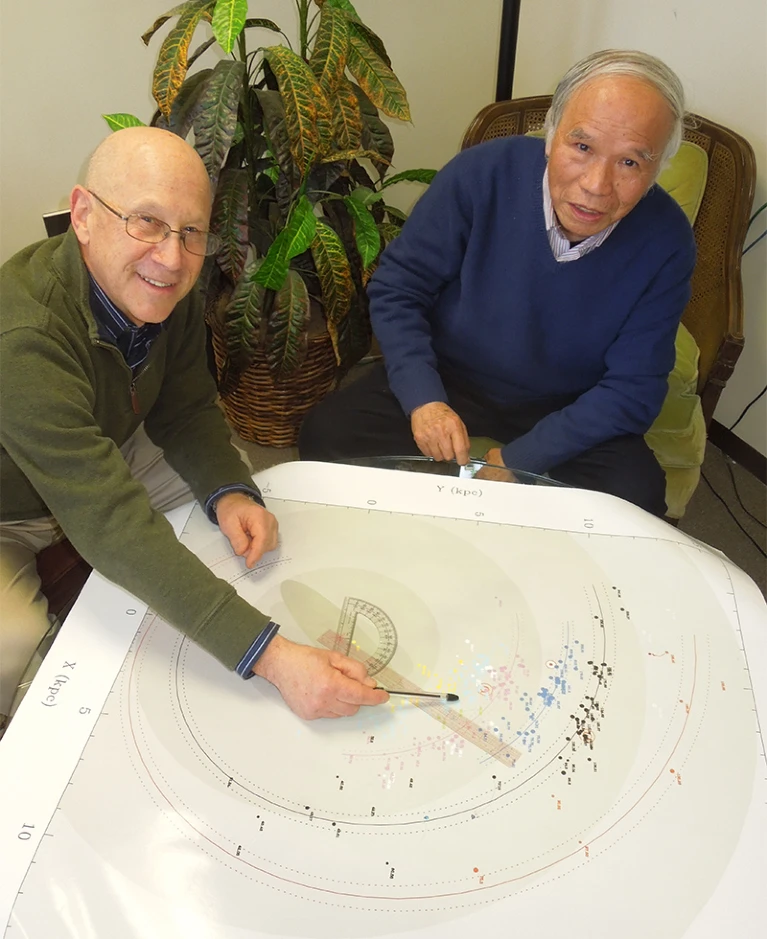Renewing Sino-US Sci-tech Pact is the Right Thing to Do

Zheng Xingwu(R), an astronomer at China’s Nanjing University(NJU)in Nanjing, and Mark Reid(L), a radio astronomer from the Harvard-Smithsonian Center for Astrophysics(CFA) in Cambridge, have unveiled a joint output—a map with the highest resolution to date of the spiral structure of the Milky Way. (PHOTO: Zheng Xingwu & Mark Reid, NJU& CFA)
By TANG Zhexiao
The China-US Science and Technology Agreement expired on August 27 and to date, it has not been renewed by the two countries, which gives much cause for concern.
Signed in 1979, the landmark pact has been renewed every five years, promoting the two sides' collaboration in areas from atmospheric and agricultural science to basic research in physics and chemistry.
Beyond government-to-government cooperation, the pact also states that the two countries will promote "the development of contacts and cooperation between universities, organizations, institutions, and other entities of both countries."
Led by U.S. congressman Mike Gallagher, chairman of the congressional Select Committee on China, critics have written an open letter to oppose the pact's renewal over "national security" concerns, saying the U.S. should stop "fueling its own destruction" by naively collaborating on research. (See Page 3 of S&T Daily on July 13. )
Different from the hawks' calling for an ending, a lot of scientists and experts support collaboration, holding the view that the two sides' partnership brings progress in the number of basic science and big science projects, which benefits all of human society.
John Holdren, a research professor at Harvard University's Kennedy School of Government, who has more than 40 years of collaborating experience with Chinese counterparts on science and technology, believed that bilateral sci-tech agreements between the U.S. and China have provided "immense value."
Wide-ranging sci-tech outcomes in collaborative projects have been yielded results and deeply benefited to the U.S. and the rest of the world. Chinese and U.S. scientists jointly discovered how folic acid could prevent birth defects, cooperation in the influenza project initiated in 2004 provided much better sampling for developing each year's global annual flu vaccine, and the collaboration of the U.S. Forest Service with its Chinese counterparts has advanced control of forest pests.
Over the decades, thousands of collaborations have been facilitated that moved forward understanding of the Earth, human origins, and the huge variety of flora and fauna, according to the Center for Strategic and International Studies based in Washington DC, adding that the U. S. loses access to data and to knowledgeable partners without this collaboration.
The U.S. arguably stands to gain more from collaboration with China now than ever before, said Bloomberg News.
If the U.S. and China work together, the rest of the world come onboard, and then the pace of innovation can really accelerate, said Bob Li, a medical oncologist and physician ambassador to China and Asia-Pacific at the Memorial Sloan Kettering Cancer Center in New York.
In fact, scientific relations between the U.S. and China have worsened in recent years, when the "China Initiative" launched to target researchers with Chinese ties. This has led Biden administration sharpening its focus on technological competition.
However, neither supporting for open science nor pushing global cooperation, the Washington shouldn't crack down Beijing via turning its partner away.
Many scientists warn that as China is making its greatest contributions to scientific advancements, Washington's severing ties may slow American progress in critical areas such as biotechnology, clean energy and telecommunications, according to The Wall Street Journal.
Joint efforts are not only important for accelerating scientific advances, but for strengthening ties between nations. Obviously, the advantage of strengthening opening-up and cooperation and promoting bilateral and multilateral inter-governmental sci-tech cooperation outweights its disadvantages.
Doing science with China makes the U.S. stronger, as Bloomberg noted, so renewing the pact is the right thing to do and Biden shouldn't be cowed.
Though U.S. State Department said on August 23 that a six-month extension will keep the pact in force as the U.S. can undergo negotiations with Beijing to "strengthen the terms," it's hoped that is not an excuse to block the renewal of the pact.






